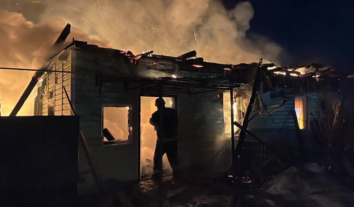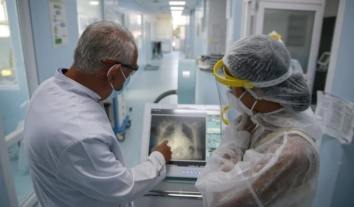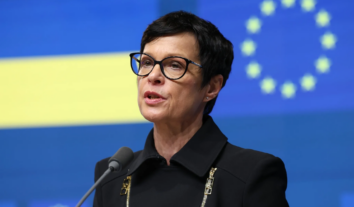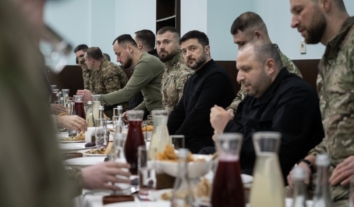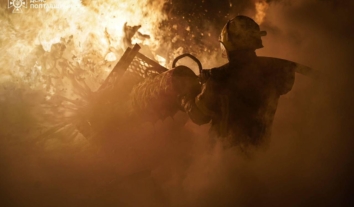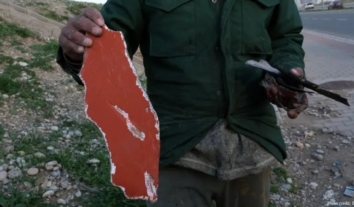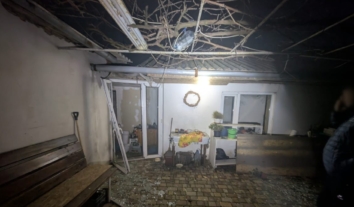Death toll rises to five after Russian bombings in Kharkiv on September 24, dozens injured
The death toll from Russian airstrikes on Kharkiv on September 24, 2024, has risen to five. A total of 36 people were injured in the strikes, according to Oleh Syniehubov, head of the Kharkiv Oblast Military Administration.
A woman, 72, who sustained severe injuries from the Russian attack died in intensive care.
“Sadly, a 72-year-old woman who had been in intensive care after the occupiers’ strike on September 24 passed away. A total of five people have now died as a result of the enemy strike that day,” he wrote.
Russian army personnel struck an apartment block in the north-east Ukrainian city of Kharkiv on September 24, 2024. The wave of strikes, which officials said hit four districts of the city, was conducted by Russia using guided glide bombs.
“The targets for Russian bombs included a residential building, a bakery, a stadium… that is, the ordinary life of ordinary people,” said Ukraine’s President Volodymyr Zelenskyy that day.
BBC News noted Russia has increasingly been using glide bombs in recent months – Soviet-era bombs fitted out with wings and satellite navigation aids. They are cheap, destructive, and are said to have been key to Russia’s effort to capture further ground in Ukraine.
Russia used them in May in attacks on Kharkiv, while military analysts also noted that these bombs appeared for the first time in Zaporizhzhia city on the night of September 22, 2024. According to Ivan Fedorov, head of the Zaporizhzhia Oblast Military Administration, Russians struck Komyshuvakha and Novooleksandrivka hromadasі at least four times. The blast wave and wreckage from the Russian bombs damaged houses and property.
Later, he added that a 74-year-old woman was killed, and two 67-year-old women were injured in the attack.
Moreover, Russians killed two people and injured seven in a cluster munitions strike on a residential neighbourhood in Borova, Izium district, Kharkiv Oblast. Residential buildings caught fire as a result of the attack.
Over the past week, Russians launched over 900 guided aerial bombs, about 400 Shahed loitering munitions, and nearly 30 missiles of various types during their attacks targeting Ukraine, according to the Ukrainian President Volodymyr Zelenskyy.
Earlier, Reuters reported that Ukraine considers China to be the biggest problem due to the fact that most components in Russian weapons found on Ukrainian battlefields are of Chinese origin.
Vladyslav Vlasyuk, an adviser to Zelesnkyy, noted that approximately 60% of foreign components used in conventional weapons come from China. He explained that this has been a key topic of discussion with various manufacturers, and emphasized that the biggest challenge in this regard is the People’s Republic of China.
He stated that Russia uses Chinese components in drones, surveillance systems, and even missiles. Moreover, some components are also supplied from the United States, the Netherlands, Japan, Switzerland, and other Western countries, despite sanctions.
Vlasyuk stated that the European Union could increase its efforts to stop the flow of Western products to Russia. For example, by also taking measures against the Russian state nuclear energy corporation Rosatom.
He mentioned that Rosatom is suspected of using its networks to supply the Russian military. However, European capitals are hesitant to act, given Russia’s significant role in the supply of nuclear power plants.
According to Vlasyuk, the bloc could also target Russian logistics, such as airports and seaports, as well as financial institutions that facilitate sales. He also pointed to the US sanctions package on IT, which he said was very effective after coming into force earlier this month.
During his address to the General Assembly, Volodymyr Zelenskyy warned that Russia plans to attack three nuclear power plants in Ukraine as winter approaches.
In addition, he urged countries to support Ukraine’s Peace Formula, asserting that it is the only path to a just peace. The Formula consists of ten points.
The Ukrainian President argued that other initiatives, including those proposed by China and Brazil, would allow the aggressor state to continue its war against the Ukrainian people.

